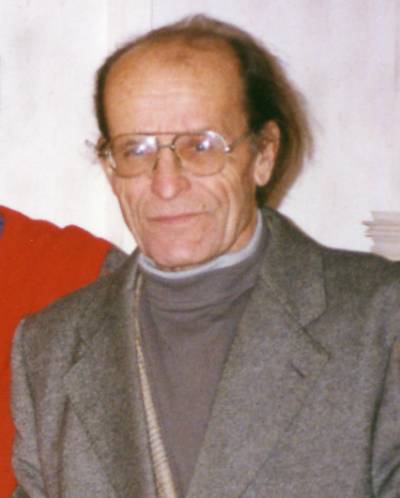
Mykola Omelianovych Samoylenko (born November 11, 1917, in the village of Spaske, Novomoskovsk Raion, Dnipropetrovsk Oblast – died May 11, 2011, in the village of Novosilkу, Kyiv-Sviatoshyn Raion, Kyiv Oblast). Ukrainian poet, UPA soldier, political prisoner.
From a peasant family. He studied at the Dnipropetrovsk Technological Institute, but his passion for literature prevailed. He entered the Faculty of History and Philology at Kyiv University. At the beginning of the war, after his fourth year, he was mobilized and took part in the defense of Kyiv. He joined the underground activities of the OUN and UPA in the German-occupied Dnipropetrovsk region, working in an underground insurgent field printing press. In 1944, he was detained by Smersh counterintelligence. He did not hide his anti-fascist and anti-Bolshevik stance, immediately admitted his participation in the Ukrainian national resistance, and faced his sentence with a clear conscience, betraying no one. He was sentenced to 10 years of imprisonment and permanent exile. He served his sentence in camps in Kaspiysk (Makhachkala), Krasnoyarsk (the “Shubny” camp point), and Karaganda (in the settlements of Churbay-Nura and Saran). For four and a half months, he shared a bunk with Lev Gumilyov. They often spoke one-on-one. “It was truly God's mercy upon me. I forgot I was in a concentration camp,” Samoylenko recalled.
He had been writing poetry since his student years. In the camps, he preserved his poems in his memory and on small scraps of paper, which he tucked into cigarette-burned holes in his padded jacket.
He was released in 1954. He graduated by correspondence from the Almaty Construction Technical School with a degree in civil engineering.
During the “Khrushchev Thaw” in 1963, he left Karaganda without permission and made his way to Kyiv. He associated and was friends with translators M. Lukash and H. Kochur, and poets V. Pidpaly and Ye. Cherednychenko, among others.
He worked as a foreman of a construction brigade at the experimental farm of the Ukrainian Scientific Research Institute of Horticulture. In 1965, acquaintances asked Samoylenko to hire V. Stus, who could not find work anywhere after being expelled from his postgraduate studies. Stus worked first in the construction brigade and then as a stoker in the boiler room. Samoylenko supported Stus spiritually and shared his own experience as a prisoner.
In 1971, he published a collection of poems titled “Anticipation.” Subsequently, he published 10 more collections: “From the Flocks of Spring” (1989), “The World is Singular” (1990), “Confession” (1992), “The Brush of a Wing,” “I Wanted to Survive” (1993), “The Bells,” “The Law is Taiga” (1994), “Yasa” (1995, awarded the “Blahovist” literary prize), “In Deep Autumn” (1996), and “Good Night” (1997).
In 1993, he compiled and published the collection of poetry by political prisoner poets, “From the Siege of Night.”
He participated in the creation of the Society of Political Prisoners and the People’s Movement of Ukraine (Rukh). In 1997, he suffered a stroke and was seriously ill.
He was a member of the Writers' Union of Ukraine (1989) and a laureate of the “Blahovist” literary prize for the collection “Yasa” and the V. Marchenko Prize.
Bibliography:
Samoylenko, Mykola. “It Had to Be.” In *He Never Outloved His Early Anxiety…: Vasyl Stus – Poet and Man: Memoirs, Articles, Letters, Poems*, compiled by O. Yu. Orach (Komar). Kyiv: Ukr. pysmennyk, 1993, pp. 144–150; *Also*: *Vasyl Stus: Poet and Citizen. A Book of Memoirs and Reflections*, compiled by V. Ovsienko. Kyiv: Vydavnytstvo “Klio,” 2013, pp. 405–409.
Simak, Hryhoriy. “A Poet’s Hard Fate.” *Litsa. Gazeta o lichnostyakh i litsedeyakh*. October 12, 2007. http://www.litsa.com.ua/show/a/2951
*Resistance Movement in Ukraine: 1960–1990. An Encyclopedic Guide* / Foreword by Osyp Zinkevych, Oles Obertas. – 2nd, supplemented ed. – Kyiv: Smoloskyp, 2012. – 896 pp. + 64 illustrations (Samoylenko: p. 630).
Poetry from Behind Bars [Text]: an anthology: [poetic works of Ukrainian political prisoners in Soviet prisons and concentration camps] / compiled by O. Holub; foreword by L. Tarnashynska. – Kyiv: Smoloskyp, 2012. – 872 pp. (M. Samoylenko: pp. 611–622).
Compiled by V. Ovsienko. November 2017.
Characters: 3,758.